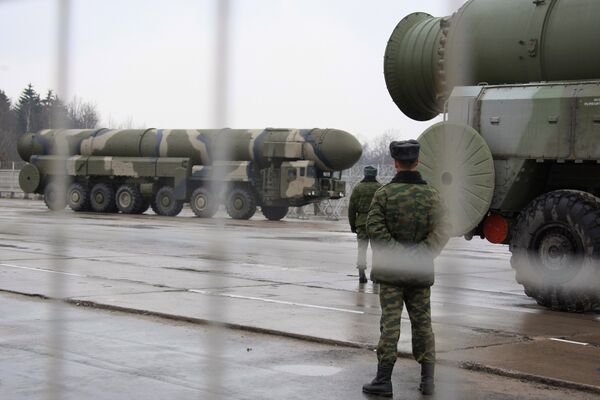A possible global arms trade treaty set to be discussed at a United Nations conference is unlikely to prove effective as major arms traders, including Russia and the United States, have no interest in reducing weapons sales, Russian analysts said on Tuesday.
The New York conference, bringing together delegates from more than 150 countries, was due to open on Monday. Its opening was delayed, however, after Arab nations demanded that the Palestinians, who have observer status at the UN, receive a seat at the conference, a move strongly opposed by Israel.
The conference aims to produce a legally binding treaty to improve the regulation of the global arms trade, estimated to be worth $60-$70 billion (£40-50bn) per year, and reduce the 750,000 annual deaths caused by arms-related incidents.
In a joint statement issued ahead of the talks, Britain, France, Germany, and Sweden said the illicit trafficking of arms was a "growing threat to humanity" and urged support for the pact.
But Russia, the world’s second largest arms exporter after the United States, as well as other major arms traders, are “not very interested in this treaty,” military analyst Alexander Goltz said.
It was to a large extent due to Russia and China’s position that the process of drafting the treaty was so slow, he said.
“It’s a serious problem for Russia, because the draft treaty includes a provision prohibiting arms sales to countries where human rights are violated, while a large part of Russia’s arms sales clients are on the list of such states,” Goltz said.
The provision, which states that arms should not be sold to a country if there is a “substantial risk” that they will be used to “commit or facilitate serious violations” of human rights, is too ambiguous, critics say.
“The question is who will decide whether human rights are violated in a country or not, and if they are, what is the scale of such violations and whether this should lead to restrictions or a ban on arms deliveries,” Goltz said.
Russian President Vladimir Putin said on Monday the country exported over $6.5 billion worth of military equipment in the first half of 2012, a 14-percent increase year-on-year, and was planning to sell a total of $13.5 billion worth of weaponry in 2012.
Russian annual arms exports doubled over six years from $6 billion in 2005 to over $13 billion in 2011, Putin said.
With no end in sight for a bloody conflict in Syria, Russia has faced accusations from Western powers over its continued arms supplies to the Syrian government. Syrian opposition activists say the crackdown by the authorities against peaceful anti-government protests triggered a large-scale armed rebellion.
Moscow says its weapons deliveries to Syria are in line with international law and that none of the arms supplied are of a type that could be used against peaceful protesters.
The Kremlin has opposed a proposal for a UN arms embargo on Damascus and has in turn accused the United States and its regional allies of supplying arms to Syrian rebels.
Russia has long been Syria's primary military supplier and currently has an estimated $4 billion worth of arms contract in Syria, according to a report from global analysis firm Oxford Analytica.
If the prospective arms trade treaty does in fact include a ban on weapons sales to countries where human rights are violated – which Russia has admitted have taken place in Syria – this would make it harder for Russia to continue delivering arms to Damascus.
Alexander Kramchikhin, a chief analyst at the Moscow-based Institute for Political and Military Analysis, said Russia has been seeking to limit the restrictions to be included in the treaty to small arms.
He said he believed the arms trade treaty, if adopted, would repeat the fate of the Convention on Cluster Munitions (CCM), an international treaty that prohibits the use, transfer and stockpile of cluster bombs.
Dozens of states have signed and ratified the document, but most of them have never produced or possessed cluster bombs, Kramchikhin said.
“Neither Russia, nor the United States or any of major Asian countries have signed this document, which means it has a zero importance,” he said. “I believe the same will happen to an arms trade treaty.”
The treaty would require unanimous consensus by all member states. If no agreement is reached by the end of the conference on July 27, it could be brought before the UN General Assembly and adopted with a two-thirds majority vote, Western media reports quoted Brian Wood, international arms control and human rights manager at Amnesty International, as saying.


